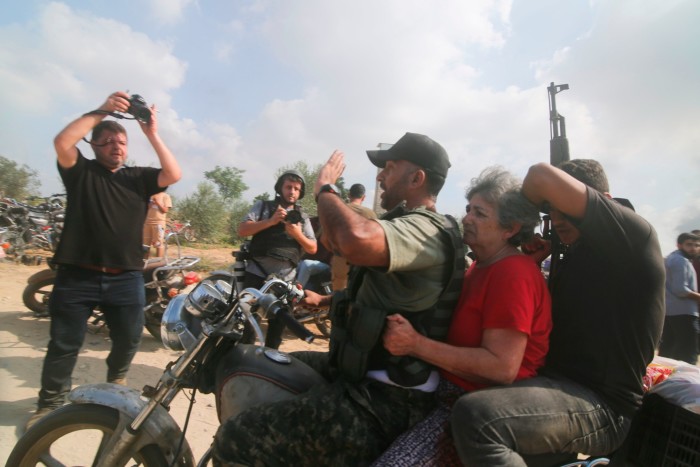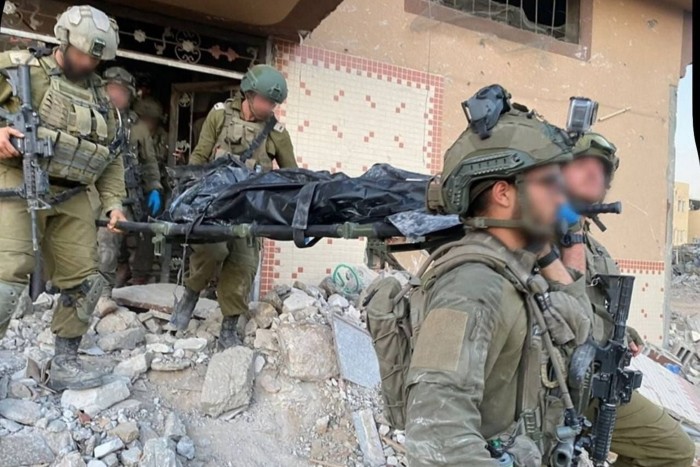
For more than a year, Israel’s most wanted man proved elusive as the weight of the Israeli military hunted him through the ruins of Gaza. But Israel’s relentless search for Yahya Sinwar finally ended in a bombed-out building in the besieged strip’s south.
On Thursday, Israel’s foreign minister Israel Katz said Sinwar “was killed today by [Israeli] soldiers” in what he called a “great military and moral achievement”. Hamas has not confirmed the death of its leader, the architect of the group’s October 7 2023 attack on Israel.
From the moment just over a year ago when Hamas militants broke out of Gaza and rampaged through southern Israel, Sinwar was catapulted to the top of Israel’s hit list.
The 61-year-old, the leader of Hamas in the coastal territory since 2017, was swiftly identified by Israel as the instigator of the cross-border assault, during which, according to Israeli authorities, militants killed about 1,200 people and seized 250 hostages.

As Prime Minister Benjamin Netanyahu launched Israel’s ferocious retaliatory offensive on Gaza, he described Sinwar as a “dead man walking”. His assassination became a prime objective of the Israeli leader’s pledge to eradicate Hamas.
Yet as tens of thousands of Israeli troops poured into Gaza, Sinwar evaded capture. While he has not been seen in public since Hamas’s 2023 attack, he was believed to be hiding out in its vast tunnel network, using it to move from location to location even as Israel pummelled the besieged strip from the air, land and sea.
Swaths of the enclave were turned into rubble-strewn wastelands during an offensive that killed more than 42,000 people, according to Palestinian health officials. But still, there were no signs of Sinwar.
In February, the IDF released a grainy video that purported to show him and his family in the darkness of a tunnel under Khan Younis, the southern Gazan city where he was born in a refugee camp. But he remained at large, even as his key commanders Mohammed Deif and Marwan Issa were killed in Israeli air strikes.
He emerged last month to issue a series of rare “letters” and statements, including one to Algeria’s president congratulating him on his re-election; another to Hassan Nasrallah, leader of Lebanese militant movement Hizbollah shortly before his assassination; and a third to their Houthi rebel allies in Yemen.
He also praised the Palestinian “resistance” and said it was preparing itself for a battle of attrition against Israel.
In recent weeks, Israel has shifted its focus to Hizbollah in Lebanon, but it has continued to pound Gaza, and search for Sinwar.
He rose to prominence in Hamas shortly after the Islamist movement was formed during the first Palestinian uprising, or intifada, in the 1980s, initially as an adviser to Hamas’s wheelchair-bound founder, Sheikh Ahmed Yassin.
He helped build the group’s military wing, the Qassam Brigades, the force that has been decimated by Israel’s year-long offensive. He also led Hamas’s notorious internal security division, which was tasked with hunting down Palestinians suspected of collaborating with Israel.
Sinwar’s ruthlessness earned him the nickname the “butcher of Khan Younis”, and in the late 1980s — when Israel occupied Gaza — he was arrested by Israel for murdering collaborators and was handed multiple life sentences.
During more than 22 years in an Israeli prison, he became leader of the members of Hamas in detention and studied Hebrew, as well as his enemy.

An Israeli intelligence assessment of Sinwar during this time attempted to capture his character. It described him as “cruel . . . authoritative, influential, accepted by his friends and with unusual abilities of endurance, cunning and manipulative, content with little . . . keeps secrets even inside prison among other prisoners . . . has the ability to carry crowds.”
He was eventually released as part of a 2011 prisoner swap in which more than 1,000 Palestinians were freed in exchange for Israeli soldier Gilad Shalit, who was held by Hamas in Gaza.
Israel officials who spent time with Sinwar described him as a charismatic man of few words, a quick temper and a commanding presence. He gained near mythical status among Palestinians as the feared — but also respected — leader of the “resistance” against Israel.
By the time of his release, Hamas was in full control of Gaza. Israel had pulled out in 2005, and the following year Hamas, which has a political as well as a military wing, won Palestinian elections.
It seized control of the strip in 2007 after an internal civil war with the rival Fatah faction.
A decade later, Hamas selected him as its leader in Gaza, with Sinwar replacing Ismail Haniyeh, a move seen as a sign of hardliners from the military wing taking over from more pragmatic factions within the group.
He led Hamas in Gaza during an 11-day conflict with Israel in 2021, but Israel assessed that the group had been deterred from triggering a full-blown conflict and was more interested in reaching a broader agreement with Israel. In the weeks before October 7 2023, Israel was in talks that would allow more work permits for Gazans to enter Israel.
But October 7 revealed that Sinwar had been long plotting what would become the deadliest assault inside Israel in the state’s 75-year history.
As the Gaza war ground on, Sinwar and Haniyeh, the group’s political leader living in exile in Doha, became integral to the diplomatic efforts to secure the release of hostages and end the war in Gaza.
Haniyeh acted as Hamas’s chief negotiator with Qatari and Egyptian mediators, passing messages through a secret channel of communications to Sinwar, who had the final say, in Gaza.
But in July, Haniyeh was killed in a suspected Israeli attack in Tehran, and Sinwar took over the role as political leader. That cemented his hold over the group even as he hid out in the devastated strip, his forces under constant barrage and ever more depleted.
The US and Israel repeatedly blamed Sinwar for the failure of the talks. Others blamed Netanyahu, who vowed to continue the military offensive until Israel achieved “total victory”.
“This was the inevitable end. One way or another [Sinwar] was done, and he knew it,” said a western diplomat. “He sacrificed his own nation for his own obsessive, sociopathic nature.”
Gazans will hope that, if confirmed by Hamas, the death of Sinwar would be sufficient grounds for Israel to end its devastating offensive that has triggered a catastrophic humanitarian crisis.
“I thought I would feel happy if Sinwar was killed. [But] it feels mixed and weird,” said Mohammed Nafiz, a 28-year-old in Khan Younis.
“He started the whole thing. If his death doesn’t lead to the end of the war then there’s nothing to be happy for.”
Additional reporting by Mai Khaled in London